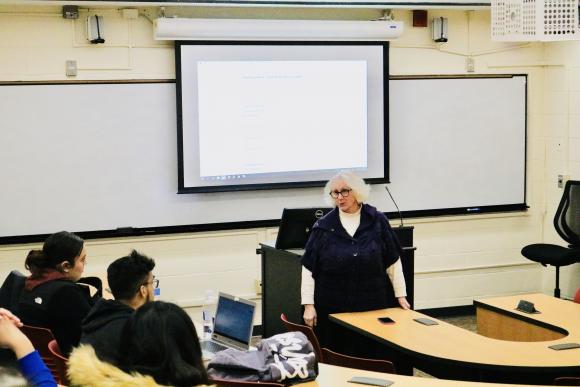
Rutgers undergraduate students who want to attend law school just got some great advice from someone who knows – Anita Walton, the Assistant Dean for Admissions for Rutgers Law School.
Walton spoke to a group of undergraduate students in mid-February through the Pre-Law advising program organized by Lisa Abreu Morel, Pre-Professional Advisor at the School of Arts & Sciences - Newark.
Morel said, "We’re always happy to host Rutgers Law School. Our Pre-Law services focus on preparing students by providing access to important information pertaining to their interest in a legal education and connecting them with excellent resources like Dean Walton."
Students can learn more at the Pre-Law website, which includes a list of activities taking place this semester.
Walton, who oversees admissions at Rutgers Law in Newark, had the following advice for prospective law students:
- Access the Law School Admissions Council (LSAC) website to start the application process.
- Attend free campus forums on financial aid and legal careers before applying the law school and to stay in touch with pre-law advisors to learn more about career opportunities after law school graduation.
- Study hard before taking the Law School Admissions Test, or LSAT. Admissions officers see all of the LSAT scores if a student takes the test multiple times, and that the overall score is not aggregated, like it is for undergraduate standardized tests. “It’s important to prepare well,” Walton said.
- Practice taking the LSAT test, which is a skills test. Students should practice taking timed sample tests timed also to get comfortable with the format. Besides the free prep materials listed on the LSAT website, students may also opt to take a preparatory LSAT course, but can also consider buying an LSAT prep book from a book store or investigate free prep sources such as the Khan Academy, which is offered through the LSAC website.
- Consider who should write the two letters of recommendation needed for submission, in addition to transcripts and LSAT scores. Admissions officers will look at a student’s GPA each of that student’s four years in college, and may closely examine their grades in their major field of study.
- Write a great personal statement that includes information about your life story and why you want to go to law school.
- Do an internship at a law office, courthouse or with a judge to gain more experience in the legal field.
- Visit law schools to get a feeling if that school is the right fit.
- Look honestly at finances and undergraduate loan debt to make sure attending law school is financially possible. Look at your credit score to get the best loan rates possible.
- Enlist your family’s support to undertake law school. A student may need financial assistance, a place to live, quiet time to study, and emotional support to get through law school.
Though she challenged the students that law school can be a “difficult and intellectual experience” she also encouraged them to apply, especially to Rutgers Law School, which is a fraction of the cost of other nearby schools. Walton said, “Don’t be afraid to try. . . Good luck, work hard, and come see us.”